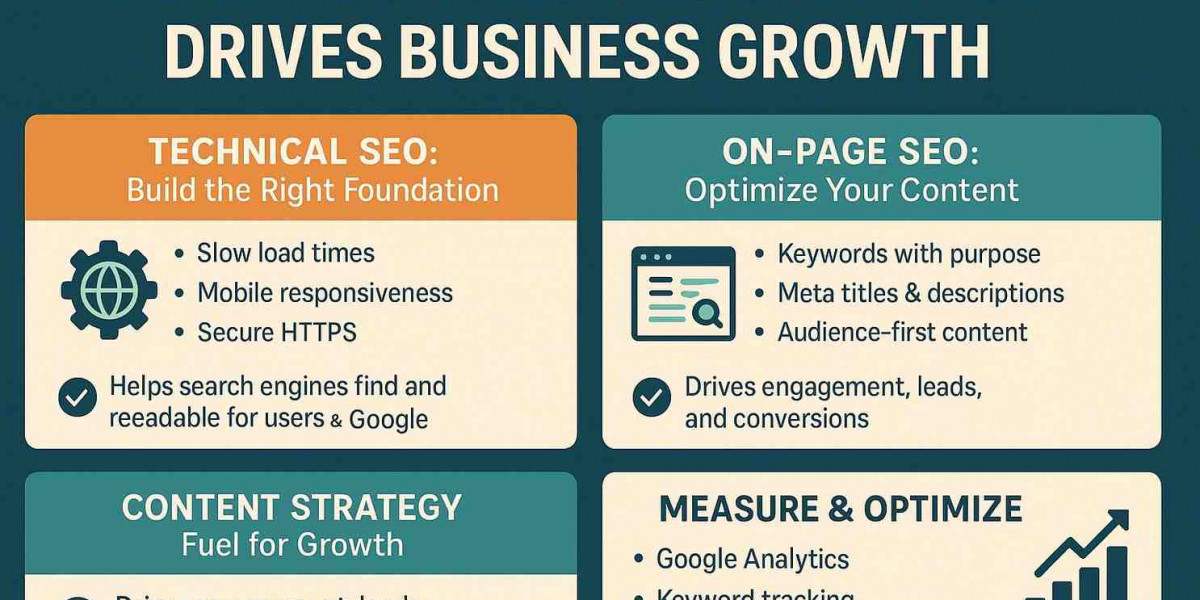In today’s digital-first world, having a great product or service is just the beginning. The real challenge lies in visibility—getting discovered by the right audience at the right time. This is where Search Engine Optimization (SEO) plays a transformative role.
A well-executed SEO strategy does more than increase website traffic—it builds brand credibility, enhances user experience, and drives long-term business growth. In this article, we’ll explore how a comprehensive SEO approach, when properly implemented, can significantly impact a company’s success.
The Business Case for SEO
Search engines are the primary way people discover new products, services, and solutions. Google alone processes over 8.5 billion searches per day. Ranking on the first page—especially among the top three results—can lead to exponential increases in traffic, leads, and sales.
Key Business Outcomes of Strong SEO:
Higher Organic Visibility
Increased Web Traffic with Buyer Intent
Better User Experience (UX)
Cost-Efficient Lead Generation
Sustainable Long-Term ROI
Core Pillars of a Proper SEO Strategy
1. Technical SEO: Laying the Foundation
This is the backbone of your website’s searchability.
Fast page load times
Mobile responsiveness
Secure HTTPS protocol
Crawlability and indexation
Structured data (schema markup)
Why It Matters: No matter how good your content is, it won’t rank well if your site is slow, broken, or hard for search engines to understand.
2. On-Page SEO: Content Meets Relevance
This involves optimizing the content and structure of your website’s pages.
Keyword research & placement
Optimized meta titles and descriptions
Proper header structure (H1, H2, etc.)
Internal linking strategy
Image optimization (alt text, file size)
Why It Matters: Great on-page SEO ensures your content is easily discoverable, understandable, and valuable to both users and search engines.
3. Off-Page SEO: Building Authority
Refers to actions taken outside your website to boost your credibility.
Quality backlinks from reputable sources
Social signals (shares, mentions)
Guest blogging & PR
Brand mentions across the web
Why It Matters: Google sees backlinks as votes of confidence. More authoritative links = higher rankings.
4. Content Strategy: Fueling the Engine
SEO without content is like a car without fuel. You need informative, engaging, and valuable content aligned with search intent.
Blogs, guides, whitepapers
Product/service landing pages
FAQs and knowledge bases
Evergreen + timely content
Why It Matters: Content builds trust, nurtures leads, and supports every stage of the customer journey.
5. Local SEO: Dominating Local Markets
Crucial for brick-and-mortar businesses or service providers targeting a specific geographic area.
Google Business Profile optimization
Local citations (directories)
Localized keywords
Reviews and ratings
Why It Matters: 46% of all Google searches are local. A strong local SEO strategy connects you with high-intent customers nearby.
6. Analytics & Continuous Optimization
The best strategies are data-driven and adaptable.
Use Google Analytics, Search Console, and tools like SEMrush or Ahrefs
Track KPIs: traffic, bounce rate, conversions, CTR, keyword positions
Regular SEO audits
A/B testing and iteration
Why It Matters: SEO isn’t a one-time task. It’s an ongoing process of testing, learning, and improving.
Real-World Impact: Case Study Snapshot
A mid-sized eCommerce brand implemented a comprehensive SEO strategy focusing on:
Fixing technical issues
Creating buyer-intent content
Building high-authority backlinks
Targeting local keywords for their city
Results in 6 Months:
250% increase in organic traffic
150% increase in online sales
30+ new top-10 keyword rankings
3x ROI compared to paid ads
This demonstrates that organic growth through SEO is not just possible, but scalable and sustainable.
Why SEO Is Essential for Modern Businesses
Long-Term Value
Unlike paid ads, the benefits of SEO compound over time.
Cost-Effective
Once optimized, your pages continue to bring in traffic without ongoing ad spend.
Trust & Credibility
Users trust organic listings more than ads. Appearing in the top positions enhances brand authority.
Alignment With User Intent
SEO is rooted in understanding what users are actually searching for, making it the most customer-centric strategy.
? How to Get Started
Audit Your Current Website
Identify SEO gaps and opportunities.
Build a Keyword Strategy
Use tools like Google Keyword Planner, Ahrefs, or Ubersuggest.
Fix Technical Errors
Mobile usability, broken links, page speed, etc.
Create High-Value Content
Answer real questions, solve problems, and match search intent.
Invest in Backlink Building
Outreach, guest posts, partnerships.
Measure, Improve, Repeat
Let data guide your next steps.
Final Thoughts: SEO as a Growth Engine
A proper SEO strategy is not just about getting traffic—it’s about attracting the right kind of traffic, converting visitors into customers, and building long-term brand equity. Whether you’re a startup, a service provider, or an eCommerce business, SEO is one of the most powerful tools in your digital growth arsenal.
Investing in SEO today is an investment in sustainable business growth for tomorrow.



